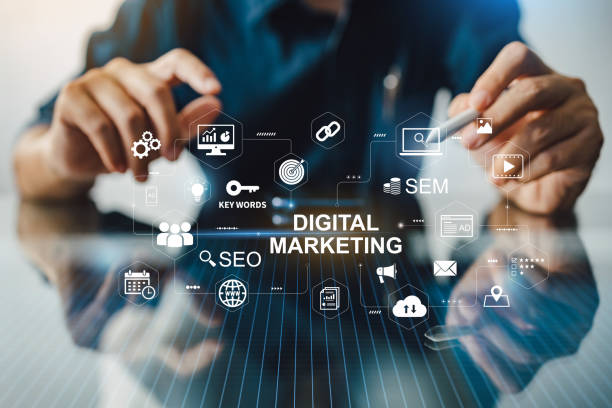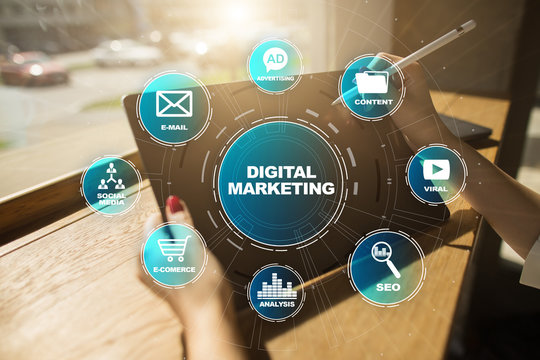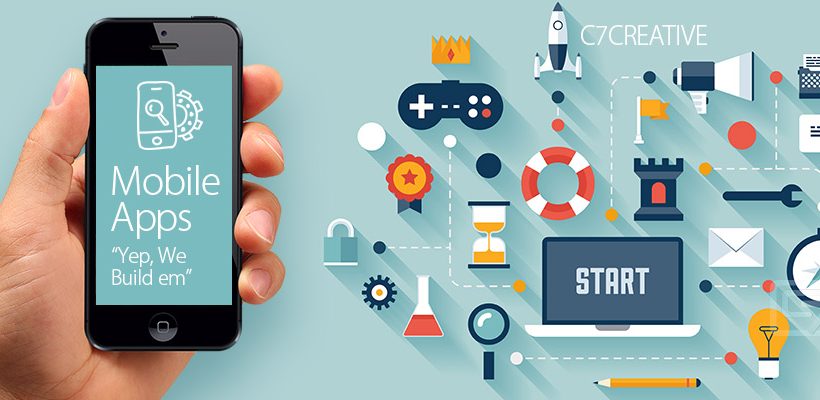Digital Marketing
Digital Marketing – The Future of Business Growth
In today’s fast-paced, internet-driven world, digital marketing has become the backbone of modern business strategies. Whether you’re a small startup or a large enterprise, digital marketing is essential for promoting your brand, reaching your target audience, and achieving business success. Unlike traditional marketing, digital marketing utilizes various online platforms and tools to communicate with customers and measure campaign performance in real-time.

What is Digital Marketing?
Digital marketing refers to all marketing efforts that use the internet or electronic devices. Businesses leverage digital channels such as search engines, social media, email, websites, and mobile apps to connect with current and prospective customers. It involves a range of techniques designed to attract, engage, and convert audiences online.

Key Components of Digital Marketing
Search Engine Optimization (SEO):
SEO is the practice of optimizing your website and content to rank higher in search engine results pages (SERPs). The higher your site ranks, the more visibility and organic traffic it receives. Effective SEO includes keyword research, on-page optimization, backlink building, and technical SEO.
Content Marketing:
Content is the king of digital marketing. This involves creating and distributing valuable, relevant, and consistent content to attract and retain a clearly defined audience. Examples include blog posts, articles, videos, infographics, and eBooks.
Social Media Marketing:
Social media platforms like Facebook, Instagram, Twitter, LinkedIn, and TikTok allow businesses to engage with customers directly, build communities, and run paid advertising campaigns. Social media is great for increasing brand awareness and driving traffic.
Email Marketing:
Email marketing is a powerful way to communicate directly with customers and nurture leads. Businesses send newsletters, promotional offers, updates, and personalized content to their email subscribers to maintain engagement and drive conversions.
Pay-Per-Click Advertising (PPC):
PPC is a model of online advertising where advertisers pay a fee each time one of their ads is clicked. Google Ads is the most popular PPC platform. PPC can deliver immediate traffic and is especially useful for product launches and time-sensitive promotions.
Affiliate Marketing:
This involves partnering with third-party publishers (affiliates) who promote your products and services for a commission on sales or leads they generate. It’s a cost-effective way to reach new audiences.
Influencer Marketing:
Influencers on platforms like Instagram, YouTube, and TikTok can promote your brand to their followers. Choosing the right influencer can help increase trust and visibility quickly.
Mobile Marketing:
With the growing use of smartphones, mobile marketing strategies target users via SMS, app notifications, mobile-optimized websites, and in-app advertising.
Video markiting
Videos are one of the most engaging forms of content. Platforms like YouTube, Facebook, and Instagram make it easy to distribute promotional and educational videos that increase engagement and conversions.

Why Digital Marketing is Important
Cost-Effective: Digital marketing is more affordable than traditional marketing, especially for small businesses with limited budgets.
Measurable Results: With tools like Google Analytics, you can track user behavior, campaign performance, and ROI in real-time.
Targeted Reach: Advanced targeting options allow businesses to reach specific audiences based on demographics, interests, behavior, and location.
Global Audience: The internet enables you to reach people from all over the world, helping businesses scale rapidly.
Higher Engagement: Interactive content, live chat, and social media features increase customer engagement and satisfaction.

Digital Marketing Trends in 2025
AI and Automation: Artificial intelligence is transforming digital marketing with automated chatbots, predictive analytics, and personalized content.
Voice Search Optimization: As voice-activated assistants become more common, businesses need to optimize their content for voice search.
Interactive Content: Quizzes, polls, AR/VR experiences, and interactive videos are gaining popularity.
Sustainability Marketing: Consumers are favoring brands that promote eco-friendly practices and values.
Short-Form Video Content: Platforms like TikTok and Instagram Reels are dominating content consumption trends.

Challenges in Digital Marketing
High Competition: With so many businesses competing online, standing out requires creativity and consistent effort.
Privacy Concerns: Data privacy laws like GDPR require marketers to be transparent and secure with user data.
Algorithm Changes: Search engines and social platforms often change algorithms, affecting visibility and reach.

Conclusion
Digital marketing is no longer optional—it is essential for businesses looking to thrive in a digital-first world. It offers unparalleled reach, cost-effectiveness, and the ability to measure and refine strategies in real-time. Whether you want to build brand awareness, increase sales, or engage with your audience, digital marketing provides the tools and techniques you need to succeed.
If you’re not investing in digital marketing, you’re missing out on countless opportunities to grow your brand and connect with customers in meaningful ways. Now is the time to embrace digital marketing and future-proof your business.

